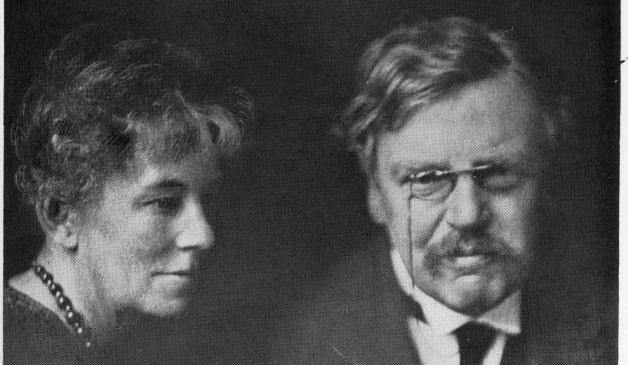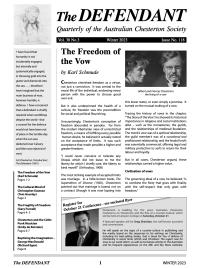
Chesterton cherished freedom as a virtue, not just a conviction. It was central to the moral life of the individual, endowing every person with the power to choose good over evil.
But it also underpinned the health of a culture, for freedom was the precondition for social and political flourishing.
Unsurprisingly, Chesterton’s conception of freedom abounded in paradox. Far from the modern libertarian view of unrestricted freedom, a means of fulfilling every possible
human desire, he believed it actually rested on the acceptance of limits. It was such acceptance that made possible a higher and greater freedom:
“I could never conceive or tolerate any Utopia which did not leave to me the liberty for which I chiefly care, the liberty to bind myself.”
Orthodoxy, 1908
The most striking example of accepted limits was marriage. In a little-known book, The Superstition of Divorce (1920), Chesterton pointed out that marriage is based, not on a contract (though it was now lapsing into this lower state), or even simply a promise. It turned on the mutual making of a vow.
Tracing the history of vows in the chapter, “The Story of the Vow”, he showed its historical importance in religious and social institutions alike – such as the monasteries, the guilds, and the relationships of medieval feudalism. The monk’s vow was of a spiritual relationship, the guild member’s was of a vocational and professional relationship, and the feudal lord’s was essentially commercial, offering legal and military protection to serfs in return for their labour and loyalty.
But in all cases, Chesterton argued, these relationships carried a higher value.
Civilisation of vows
The governing ideal of a vow, he believed, “is to combine the fixity that goes with finality with the self-respect that only goes with freedom.”
The vow carried a certain sacredness, even in a secular setting. It found expression in what Chesterton memorably called a “civilisation of vows”. This was undermined when Henry VIII broke his own vow of marriage, and visited a wider brokenness upon Western culture. “It began with divorce for a king,” wrote Chesterton wittily, “and it is now ending in divorces for a whole kingdom.”
The spiritual and social consequences were pervasive:
“The monasteries, that had been built by vows, were destroyed. The guilds, that had been regiments of volunteers, were dispersed. The sacramental nature of marriage was denied; and many of the greatest intellects of the new movement, like Milton, already indulged in a very modern idealisation of divorce.”
Why has this destructiveness continued to spread? In a much earlier essay, “A Defence of Rash Vows” (The Defendant, 1901), Chesterton defined a vow as an appointment a person makes with himself at some distant time or place. Of course, it carries the risk that he will not keep this appointment, that he will dishonour his vow – and such fear is now an over- whelming deterrent to making a vow. In Chesterton’s words:
“This terror of one’s self, of the weakness and mutability of one’s self, has perilously increased, and is the real basis of the objection to vows of any kind.” The ideal of constancy that inspires the vow is now seen as “a yoke mysteriously imposed on mankind by the devil, instead of being, as it is, a yoke consistently imposed by all lovers on themselves.”
A vow testifies to “the greatness of a great moment … a moment of immortality.” To diminish it is to rob a person of “that sense of daring actuality which is the excitement of a vow.”
Chesterton dismisses as an inherent contradiction the popular idea of “free love”. No lover is “free” in that sense, since “it is the nature of love to bind itself.” He cites a George Bernard Shaw play, The Philanderer, in which the main character “is perpetually endeavouring to be a free-lover, . . . wandering in a hungry search for a certain exhilaration which he can only have when he has the courage to cease from wandering.”
More than a century later, this “hungry search for a certain exhilaration” has become a cultural imperative, no longer simply a trend.
It has found expression in the cult of individual autonomy, which underlies the continuing fall in marriage rates and the corresponding rise in single-person households locked in virtual connections rather than participating in physical communities (“We all need people, yet more of us are living alone,” Weekend Australian, July 29-30, 2023).
This, in turn, spreads and intensifies the desperate loneliness of so many in present-day culture.
Pascal’s insight in the 17th century is proving painfully true in the 21st century – as if he anticipated the long-term consequences of Covid lockdowns and “physical distancing”:
“All the unhappiness of man arises from one thing only, namely that he is incapable of abiding quietly in one room.”
Pensées, 116
Political importance of the family
The freedom of the individual to make a vow in marriage is of political importance. In giving rise to a family, it creates the one institution that can meet the power of the state.
Its unique representation of freedom is because, as Chesterton notes, the family is “at once necessary and voluntary.” It provides a check on the state that is communal, and it goes beyond the power of the individual. Crucially, it supplies a counter-institution to the dominance of the state. In Chesterton’s words:
“The state consists of coercion; and must always be justified from its own point of view in extending the bounds of coercion; as, for instance, in the case of conscription. The only thing that can be set up to check or challenge this authority is a voluntary law and a voluntary loyalty. That loyalty is the protection of liberty, in the only sphere where liberty can fully dwell.”
